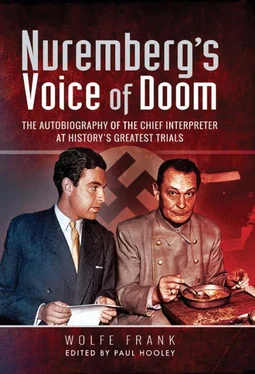However, in February 1937, the problem was solved for us during a skiing trip we had taken to the Italian Alpine resort of Sestriere. There we had met a charming English couple on their honeymoon – Humphrey Sykes [2] Humphrey Hugh Sykes, born in 1907, was to become a very important figure in Wolfe Frank’s life. He was the son of Major Herbert Rushton Sykes and Hon. Constance Harriet Georgina Skeffington. He married, firstly, Grizel Sophie, daughter of Air Vice-Marshal Sir Norman Duckworth Kerr MacEwen, in 1936, from whom he was divorced in 1948. He married, secondly, Muriel Hooper, daughter of Colonel John Charles Hooper, in 1958. He was educated at Rugby School and gained the rank of Major in the service of the 9th Lancers. He died in 1991 after having travelled from Scotland to the home of Mike Dilliway in Dorset in search of Wolfe Frank’s manuscript and other documents.
and his wife Grizel. When they heard our story they immediately invited us to stay with them in the garrison town of Tidworth in Wiltshire, where Sykes was serving with the 9th Lancers, and they told us we could get married from their house. We accepted gratefully, and details were settled; we would travel to England in April for the sole purpose of getting married.
Back in Germany, we thought the matter over and decided it would be wise not to let too many people know about the impending wedding. Only our best and most reliable friends were told before I went off to Breslau to discuss the plan with Maditta’s father, Baron Skrbensky. He was, he explained to me, ‘Far from enthusiastic about the idea’. Did he propose to intervene I asked? No, he did not – after all, his daughter was of age and it was her business – but he would warn her of the consequences that might arise from a ‘mixed marriage of this sort’. Certainly Baron, please do that. Good-bye!
Before I left Munich for England the Garden Dwarf arranged a truly imaginative event to end my days as a bachelor. We were driving up the Maximilianstrasse in his car when he spotted a very sexy looking girl in a very tight-fitting skirt. She had long, black hair and exceptionally good legs. Herbert pulled up at the curb and offered her a lift, which she accepted. She was Hungarian, not that young, but a real sex bomb. We adjourned to Osteria Italiano, our favourite bistro where the food was excellent. Soon after Herbert and the girl disappeared having instructed me to organise a farewell party. I concurred and went off with some of my friends to my pied-a-terre near the garage. Herbert appeared a couple of hours later, with the girl in tow. He looked as if he had been run over by a tractor – scratches everywhere, deep circles under his eyes, and he seemed to be staggering, not walking. His Hungarian discovery looked happy and benign – even when Herbert named her the sex-maniac author of his dilapidated condition. The others then took turns with the lovely, including Gilbert, and eventually I too succumbed to her charms.
That was that, no regrets, no comment until three days later – the night before my departure for London. We were all at the Regina Bar, looking funereal over my impending exit when Gilbert rose to go to the toilet. A few moments later he was back: ‘I’ve got the damned clap’ he announced. We all applauded. ‘Don’t you look so gleeful, Wolfe,’ said Gilbert, ‘you’ve probably got it too – from that Hungarian nympho’. He then showed me what it looked like. I felt giddy. Within twenty-four hours I would be in England, in Maditta’s bed, and I was bringing her the clap as a wedding present.
Then the committee of experts went into session and, to my great relief, finally explained that the Garden Dwarf and Gilbert were the authors of a splendid prank. Gilbert had obtained some mayonnaise at the Regina and introduced it, carefully, to make it re-emerge under my horror-stricken eyes. It was a good joke, depending on where you sat. They then drove me to the airport and waved good-bye – it was the last time I saw them all together.
Maditta, who had travelled to London ahead of me, and Humphrey Sykes met me at Croydon and we were dropped off at a small hotel in Knightsbridge, with separate rooms, of course. We wanted to see how the other half lives and spent the night apart, feeling very virtuous and, in my case, recovering from my monumental hangover.
The next day we travelled to Tidworth for another night of virtuousness, and then to Andover Registrar Office, where everything had been organised. Humphrey and Grizel were our witnesses and we had a splendid lunch somewhere, after which they dropped us at their house in Tidworth – for the young couple to be alone, at last. We felt duty bound not to disappoint them. Much later, I told Maditta the VD tale and she laughed for days.

10. GESTAPO AT THE DOOR
MADITTA AND I WERE MARRIED AT ANDOVER on 12 April 1937. Four days later we were flying back to Munich. I had a feeling of foreboding; which proved to be justified.
When we unlocked Maditta’s flat in the Beuerstrasse, I immediately saw the official looking letter on the floor. I tore open the envelope which was addressed to me. Dated 14 April (two days after the wedding) it read as follows: ‘In matters of your marriage to Maditta von Skrbensky in England you are requested to appear at this police station at your earliest convenience. The Certificate of Marriage is to be brought with you.’
The game, I knew, was up. My wife did not, of course feel the same way. She knew nothing of my previous, rather indiscreet journeys to Switzerland.
We trotted off to the police station and were received by a policeman I had known for years. He congratulated us in broad Bavarian and then proceeded to copy the Certificate, letter by letter. When he was through I asked him what the whole thing was all about? Who had made the inquiry? It had come from ‘Police headquarters’ he said, ‘and probably didn’t mean anything at all’.
That didn’t ring true. No-one, but my most trusted friends, had known of our plans. Someone must have caused inquiries to be made, and that someone could only have been Maditta’s father.
As soon as possible I called on a member of the anti-Nazi group who had, I knew, contacts at Gestapo headquarters. He promised to be in touch with me. There followed the most nerve-wracking honeymoon imaginable. I jumped every time the doorbell rang. I woke up in the middle of the night, bathed in sweat. Then on the 22 April the uncertainty was over. The call came from my friend. He would meet me in the evening. He had some news for me.
The Gestapo were indeed after me. The upshot of it was that, while we hadn’t broken any laws, I had violated the German national feeling – ‘ verstossen gegen das gesunde deutsche Volksempfinden ’ was the German phrase. This was to be rectifiable by means of an educational course I was to undergo. The place was Dachau. The time was 05.00 hours the following morning.
I decided I would not attend.
I went home to Maditta and told her that I would have to leave. We didn’t have much time to waste. After a brief discussion we decided that I would go alone. She would put our affairs in order, draw as much money as possible and follow me. It never occurred to us that she would be prevented from carrying out the plan.
Ten minutes were spent in throwing a few things into a suitcase. There was a quick ‘ auf Wiedersehen ’ and no time to get emotional. We didn’t see each other again until nearly ten years later.
Maditta’s passport was impounded and her accounts blocked. My financial affairs went haywire after my departure and there was no money she could lay her hands on. After six months her father reappeared on the scene and indicated that all this would be put right if she agreed to divorce me. For another month Maditta put up a fight. Then she signed on the dotted line.
Читать дальше













